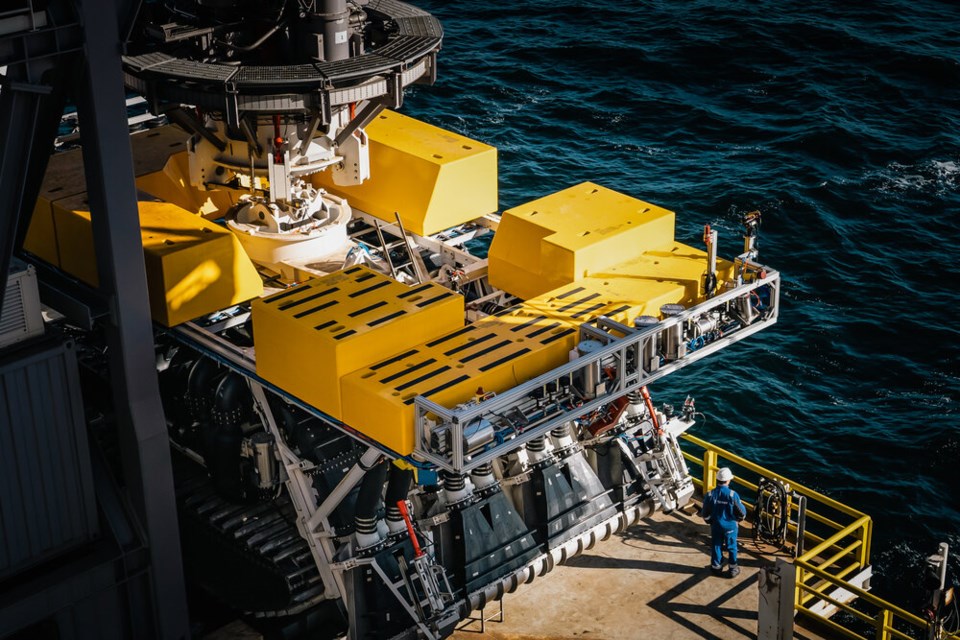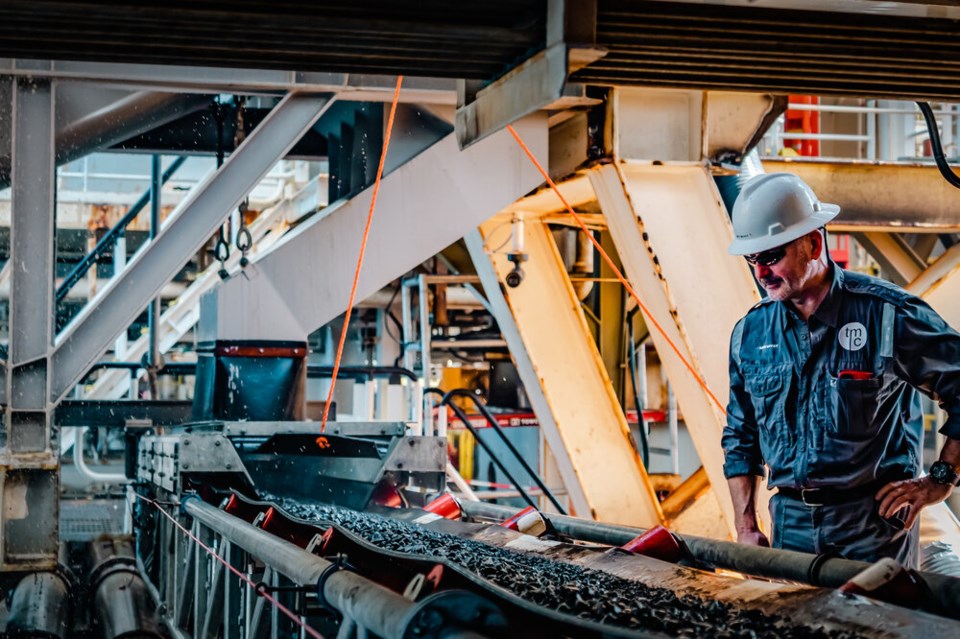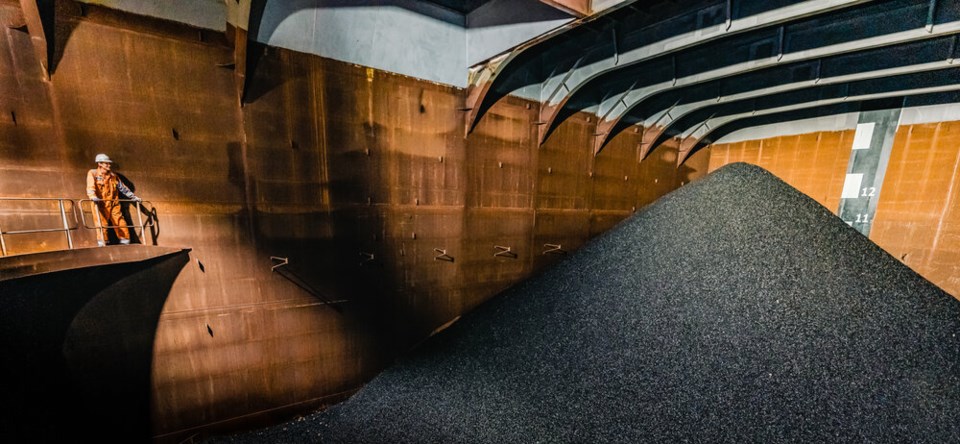A Vancouver-based company looking to kick off a revolution in deep-sea mining has been caught violating its own protocols after two videos were leaked purporting to show waste sediment getting dumped into the Pacific Ocean, three advocacy groups claim.
The videos, released by MiningWatch Canada, Greenpeace International and Deep Sea Mining Campaign Tuesday, are alleged to have been captured last fall by scientists aboard ships owned by The Metals Company as it trialled its deep-sea mining technology roughly halfway between Hawaii and Mexico.
The two videos appear to show deep-sea sediment overflowing into the ocean from the deck of the company’s 228-metre-long former drill ship the Hidden Gem.
“That’s not supposed to be happening,” said Catherine Coumans, MiningWatch Canada’s Asia-Pacific Program Coordinator. “Clearly, something went wrong here.”
The scientists who captured the video aboard the ship — and later leaked it to the three advocacy groups — had been paid by The Metals Company to monitor the environmental footprint of the company’s deep sea metal-harvesting technology, Coumans said.
In November 2022, the company said it had successfully deployed its treaded vehicle in the Pacific’s Clarion-Clipperton Fracture Zone, sucking up more than 3,000 tonnes of polymetalic nodules and transporting them up a 4.3-kilometre system of pipes to its mother ship.
The metallic nodules precipitate out of sea water over the course of tens of millions of years, and often form around a sunken shark tooth, tiny fossil or piece of basalt rock. Rich in nickel, copper, cobalt and manganese, the potato-size, deep-sea deposits have been heralded by The Metals Company’s founder as “a battery in a rock” expected to provide vast quantities of minerals to power an electric vehicle revolution.
In the past, collecting and raising them from 4,000 metres under the sea has proven technically challenging and too expensive to conduct at a commercial scale. The Metals Company says its latest deep-sea trial shows its technology works.
But Coumans says the leaked videos confirm opponents’ worries the company is not being transparent about its operations.
Based in Vancouver, @themetalsco is looking to be the first to commercially mine the deep sea in a move it says will power an EV revolution.
— Stefan Labbé (@StefanLabbe) January 11, 2023
Today, scientists aboard the company's ships leaked videos of deep sea sediment overflowing into the sea. pic.twitter.com/hWgvR7mFfQ
In a statement to Glacier Media, The Metals Company confirmed the leaked videos captured an incident at sea in October 2022, when a surge of water overwhelmed a machine that separates the deep-sea nodules from sediment, known as a “cyclone separator.”
Describing the incident as “a minor overflow,” the company said some sediment and fragments of nodules poured out of the separator and over the deck of the ship during a seven- to eight-hour test run.
“When safe to do so the test run was stopped in a controlled manner,” the company said in an email.
According to company documents, sediment washed from the nodules on the ship is supposed to be returned deep under the sea before it’s released. That way, the risk it threatens marine species is minimized, the company says.
But the videos, allegedly captured and leaked by scientists paid by The Metals Company, appear to show the Hidden Gem discharging sediment directly into the ocean’s surface.
The company said an assessment was carried out to see if the incident had the potential to harm the marine environment but found it “did not have the potential to cause harm and was, therefore, not a reportable incident.”
The Metals Company added it modified the ship-bourn separator so that later test runs didn’t lead to overflows. The incident was later reported “as a matter of courtesy” to the International Seabed Authority (ISA) — the United Nations body with the dual mandate to facilitate the extraction of mineral resources from the seabed, while at the same time protecting the deep-sea environment.

Document detailing sea trials suggests environmental monitoring flawed
The Metals Company’s strategy to monitor sediment plumes produced by mining activity was "flawed to begin with,” according to a document allegedly written by scientists on the trip.
The document, seen by Glacier Media , says scientists lacked proper monitoring tools and the plan failed to integrate established physics of how sediment plumes behave underwater.
It added employees of The Metals Company tried to influence independent scientific investigation by asking the researcher to sample water when no sediment plume was present.
Coumans says the scientists who leaked the document and the videos are remaining anonymous to avoid retribution.
Company says it has enough money to reach commercialization
The Metals Company holds a licence to access four nodule-rich areas of the Clarion-Clipperton Fracture Zone through its wholly owned subsidiary, Nauru Ocean Resources.
Last summer, the New York Times published communications and documents dating back to 2007 between executives of The Metals Company’s forerunner, Nautilus Minerals, and ISA officials. They showed the agency provided data on where to find some of the most valuable deposits of polymetalic nodules.
Gerard Barron, The Metals Company’s chief executive, told the Times he was unaware his old company received access to mining data before forming partnerships with the island nations of Nauru and Tonga.
The Metals Company, which later purchased Nautilus’s assets, holds one of 31 contracts the ISA has handed out to mine the deep sea since 2001. But all of those contracts are exploratory and none of them include provisions to carry out commercial-scale mining — largely because the ISA has yet to write the rules of the road. That changed in June 2021, when the small island nation of Nauru, acting as a sponsor of Nauru Ocean Resources, approached the ISA, requesting it establish a set of regulations that would govern how companies could mine the deep.
Through an obscure clause, the company set off a two-year countdown under the United Nations Convention on the Law of the Sea, in which ISA must finalize a set of regulations by July 2023.
In November, The Metals Company reported a $27.9-million loss in the third quarter of 2022. The company said it had just under $70 million of cash on hand by the end of September, enough, it added, to keep its operation afloat for another year.

An an untested practice in an unknown world
The prospect of opening the deep sea to mining has united strong opposition around the world, with many scientists, politicians and island communities saying it threatens largely unexplored ecosystems humans know little about.
“The biggest concern most of us biologists have is that we don't quite have a grasp on the connectivity — what happens from the sea floor to whatever we're doing on the surface; regulating our climate; and regulating our food supplies,” B.C. deep-sea researcher Verena Tunnicliffe, who is among 622 scientists calling for a moratorium on deep-sea mining, told Glacier Media last June.
In 2020, MiningWatch, together with 18 other non-governmental organizations and First Nations, sent a letter to six federal ministers to express their concerns with deep-sea mining.
Last spring, Natural Resources Minister Jonathan Wilkinson told Glacier Media his government “would be very hesitant” to be involved in or support deep-sea mining.
“The clock is ticking and we need to come forward with a position,” he said at the time.
Wilkinson did not respond to a Glacier Media request to reaffirm Canada’s position on deep-sea mining.




